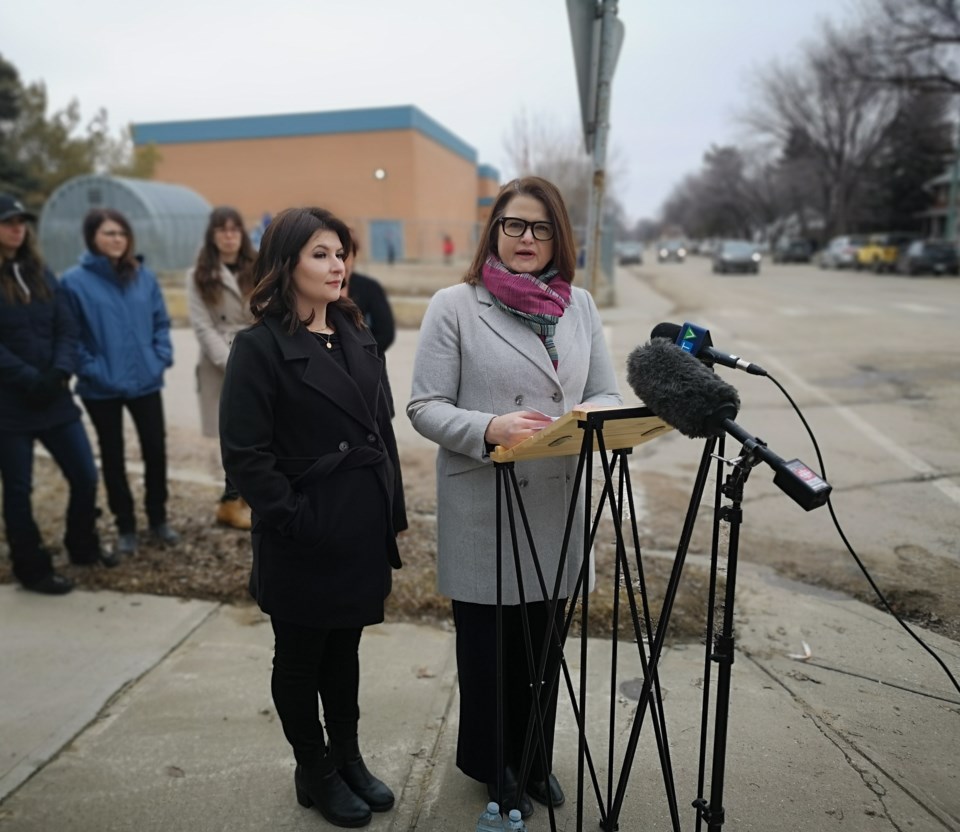The Saskatchewan Party has responded to a press conference held by the Saskatchewan NDP in front of a Moose Jaw elementary school with concerned parents and grandparents in attendance on Feb. 6.
Official Opposition Leader Carla Beck represented the Saskatchewan NDP as she attended a media presentation in front of St. Agnes School along with keynote speaker and concerned parent Ashley Harrower.
“Teachers, principals, and support staff work so hard with what they have. But it’s like they are grasping at straws. Everyone is burning out because our school divisions just can’t afford to hire and retain staff,” Harrower said at the event.
“Every kid deserves a chance to thrive, but I worry about my son’s future.”
Harrower’s five-year-old son was diagnosed with autism and finds it difficult to regulate his emotions in a classroom environment.
To cope with budgetary cuts and limited resources at the school, staff at St. Agnes School have had to improvise with what space they have available. The school’s music and art classrooms are now being converted into overflow classroom space, and specialized resources are hit even harder.
Harrower’s son requires these specialized resources to learn and thrive. With fewer resources available to the school system’s neuro-diverse students, individuals like her son often have to be sent home.
Opposition Leader Beck asked the Moe government to “Please get back to the table and make a plan to resolve the issues at hand.”
“We see a government that continuously denies that there is a problem when presented with this information,” she said. “We see them put up billboards to suggest that everything is great.”
“This is a government that is failing to value education in our province.”
Although Moose Jaw Express / MooseJawToday.com was unable to obtain a timely interview with Moose Jaw North MLA Tim McLeod following the event, the Saskatchewan Party has since provided an official statement in response to the Feb. 6 conference.
“Since 2016 - 2017, the total number of classroom teachers has increased by nearly 120 FTEs (Full Time Teacher Equivalent). There were 9,477.2 FTEs in 2016 - 2017 and there were 9,595.7 FTEs in 2023 - 2024. There were 179,707 students in 2016-17 and there were 195,582 students in 2023 - 2024.
“The 9,595.7 FTE number is calculated by taking the total for Regular Classroom Teaching FTE for 2023 - 2024 and adding the total for Distance Learning Teaching FTE for 2023 – 2024.
“These categories reflect the number of instructional teachers.
“Since 2007, we have increased school operating funding by $665 million, a 47 per cent increase, while enrolment has increased by just 16 per cent.
“There were almost 4,500 educational assistants (EAs) working in Saskatchewan schools for the 2023 - 1024 school year. This is an increase of nearly 400 compared to the 2022 - 2023 school year, and almost 700 more in the past two years. Since 2016 - 2017, EAs have increased by 1,089 or 76 per cent.
“In Saskatchewan, education is a shared responsibility. While government provides funding to school divisions, they are responsible to make staffing and programming decisions within their allocated budget to meet local priorities and address the needs of their students and staff.
“The Government of Saskatchewan is providing school divisions with $2.08 billion in school operating funding for (the) 2023 - 2024 school year, an increase of $89.4 million or 4.5 per cent, over the 2022 - 2023 school year. This includes an additional $40 million that was announced in June specifically to help support school divisions with enrolment growth and complexity of today’s classrooms. Government recently announced an additional $3.6 million to fund the specialized support classroom pilot and $2.5 million to fund the new Teacher Innovation and Support Fund.”


.png;w=120;h=80;mode=crop)

